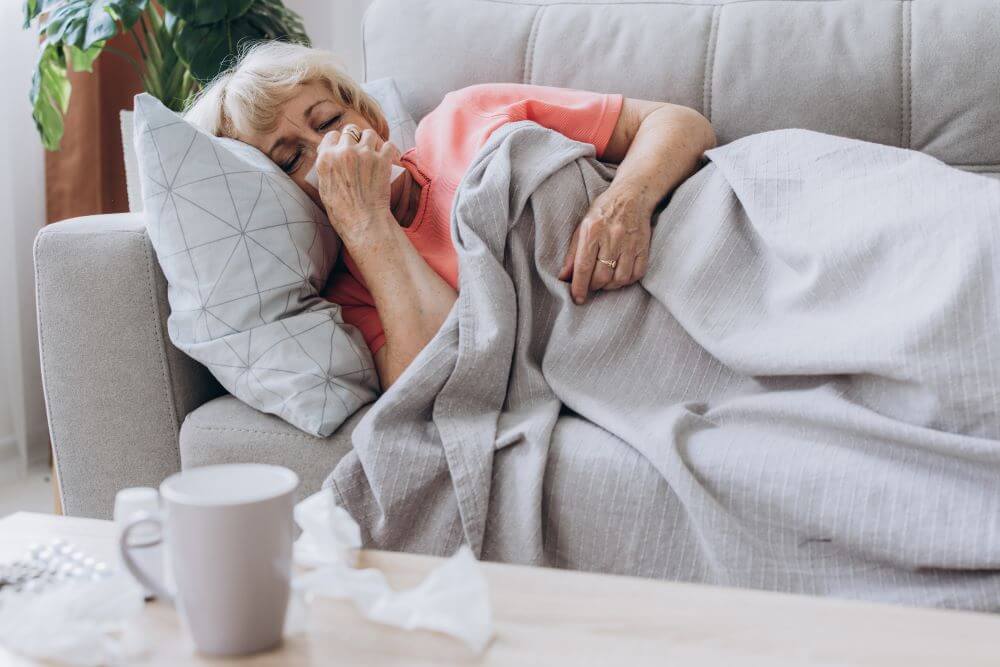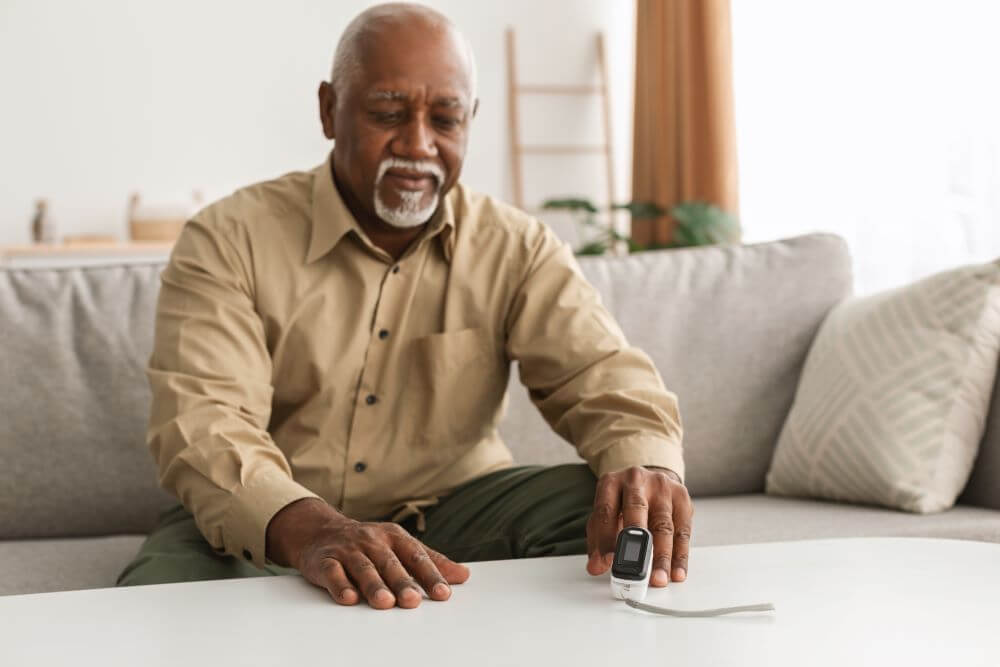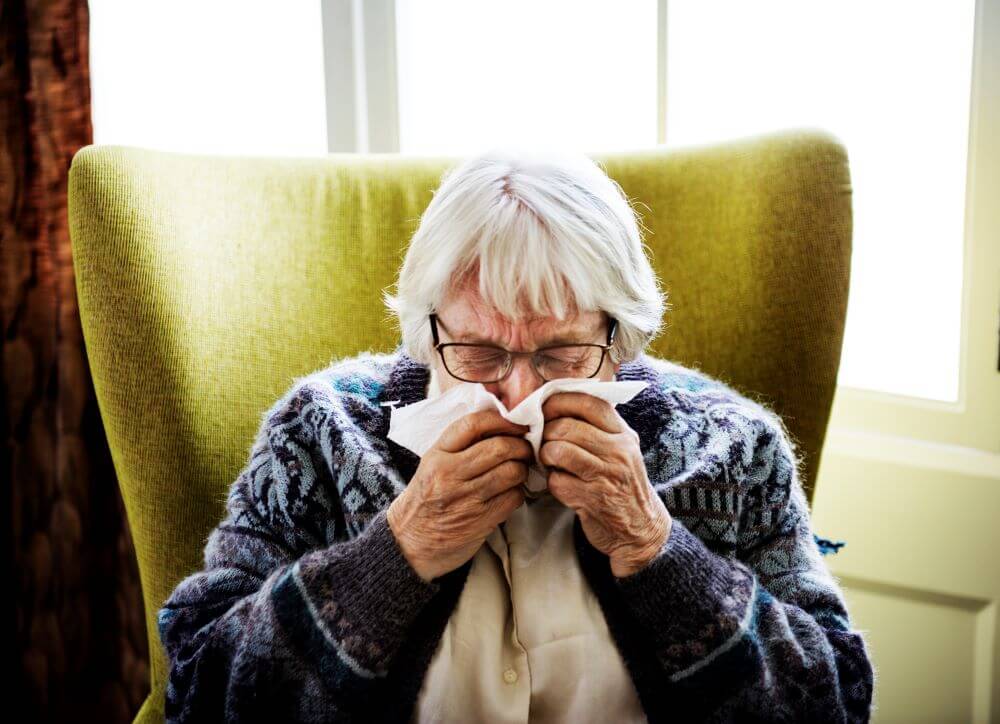Caring for a loved one with dementia comes with its own set of challenges. When they catch a cold, it can add an extra layer of complexity to the caregiving journey. As a seasoned nurse and a dementia caregiver, I understand the importance of knowing how to respond. In this article, we will explore the impact of colds on dementia patients and their dementia care. And share practical tips to make the caregiving process smoother.

Understanding the Impact of Cold & Flu on Dementia Care
When a person with dementia catches a cold, it’s not just about sniffles and sneezes. The effects can reach deeper, affecting their cognitive functions. This can make them more vulnerable to complications.
Imagine your loved one navigating through the fog of dementia and then add the discomfort of a cold. It can be a very challenging scenario.
To create an analogy, think of dementia as a cloudy day. When a cold hits, it’s like an unexpected storm. The usual navigation becomes trickier. As caregivers, our role is to guide them through it with patience and understanding.

Creating a Comfortable Environment
The first step is to ensure that the environment is favorable for recovery. Just like how we wrap ourselves in blankets when we are sick, dementia patients also enjoy a warm and cozy atmosphere. Keep the living space well-ventilated to promote good airflow, but ensure it’s not too cold. If someone with dementia gets too cold or too warm and they aren’t able to recognize why they feel uncomfortable, they often become agitated.
Adjustments in the surroundings are crucial. Place them in their favorite chair, surrounded by familiar items if possible. This can provide comfort and a sense of security. Small changes, like adding extra pillows for support or ensuring soft lighting, can make a big difference.

Monitoring and Managing Symptoms
Being attentive to the symptoms of a cold is crucial for effective care. Watch out for signs such as a runny nose, cough, or changes in behavior. The sooner you can help control the cold symptoms the happier they will be.
In a way, it’s like being a detective. You watch for clues and adapt your caregiving accordingly. Keep a record of symptoms, and don’t hesitate to seek guidance from the healthcare team. Working with your healthcare team helps ensure the best possible care for your loved one.

Common Types of Medicines for Colds and What to Watch Out For
When managing cold symptoms in individuals with dementia, understanding the types of medicines is crucial. Think of it as adding the right tools to your caregiving toolkit. There are many different cold medications on the store shelves. Deciding which medicine to use can be overwhelming.
Many brands of cold medications have the exact same medicine in them. So, looking at the active ingredient on the label is always best to determine which drug is actually in it.
Here are the common types of cold medicines, their purposes, and important considerations for caregivers:
Decongestants: Such as pseudoephedrine, phenylephrine, and ephedrine
Purpose: Decongestants relieve congestion by reducing nasal passage swelling, inflammation, and mucus.
What to Watch Out For: These medications may cause increased blood pressure and can interact with other medications. Possible side effects are drowsiness, irritation of the lining of your nose (nose spray), headaches, feeling or being sick, a dry mouth, and feeling restless or agitated.
Cough Suppressants (Antitussives): Such as Dextromethorphan, Benzonatate, or Codeine
Purpose: Cough suppressants reduce the urge to cough, relieving persistent coughing.
What to Watch Out For: Some cough suppressants may cause drowsiness and constipation. Watch for any adverse reactions.
Expectorants: Such as Guaifenesin or potassium iodide
Purpose: Expectorants help thin and loosen mucus in the airways, making it easier to cough up. They are mainly used to thin out thick phlegmy coughs.
What to Watch Out For: Ensure your loved one stays hydrated to prevent dehydration, a genuine concern for individuals with dementia!
Pain Relievers (Analgesics): Such as acetaminophen, ibuprofen, and salicylates ( aspirin)
Purpose: Pain relievers can ease fever, headaches, and body aches associated with a cold.
What to Watch Out For: Pay attention to dosages, as overdose can lead to severe complications. Avoid giving multiple medications with similar ingredients. Ibuprofen and aspirin should not be given to someone taking blood thinners without a physician’s approval. They can cause an increased risk of bleeding.
Antihistamines: Such as Diphenhydramine, Doxylamine, Azelastine, Loratadine, Cetirizine, Desloratadine, Fexofenadine
Purpose: Antihistamines help relieve symptoms like sneezing and a runny nose.
What to Watch Out For: There are several possible side effects to keep an eye out for.
- Drowsiness.
- Dry mouth, dry eyes.
- Blurred or double vision.
- Dizziness
- Low blood pressure
- Mucous thickening in the airways
- Rapid heart rate
- Difficulty urinating and constipation
- Headache
- Cough
- Sore throat
- Abdominal pain or discomfort
- Nausea or vomiting
- Joint or muscle pain
- Confusion in the elderly
Multi-Symptom Cold Medications:
Purpose: These medications often combine various ingredients to address multiple symptoms.
What to Watch Out For: Read labels carefully to avoid duplicate ingredients and prevent unintentional overdose. Consult with healthcare professionals if uncertain.
As a caregiver, it’s crucial to communicate with the healthcare team before introducing any new medications. Not all medicines interact with each other well! This includes over-the-counter medicine you can buy at the store. When in doubt, call your provider. Consider it as consulting with the experts before adjusting a well-crafted plan.
Monitor your loved one for any adverse reactions, and if you notice anything concerning, reach out to your healthcare provider.
Remember, the goal is to enhance comfort while minimizing risks associated with medication use. You become a knowledgeable and proactive caregiver by understanding these common types of medicines and their potential effects. You are better prepared to manage cold symptoms for your loved one with dementia. For more information on how to give someone with dementia medicines HERE.

Natural Home Remedies for care of Dementia Patients with a Cold or Flu
In addition to traditional approaches, consider the power of natural home remedies to provide comfort during a cold. Think of it as adding gentle ingredients to a recipe, enhancing the overall flavor of care. Here are a few suggestions:
Warm Saltwater Gargle:
If your loved one can follow directions, encourage them to gargle with warm salt water to soothe a sore throat. It’s like a warm hug for their throat, offering relief without the need for strong medications.
Honey and Lemon Tea:
A cup of warm tea with honey and a splash of lemon can be both soothing and hydrating. It’s like a cozy blanket for the inside, providing comfort during cold days.
Pineapple Juice:
Bromelain is an enzyme that can only be found in the stem and fruit of pineapples. Evidence shows that it can help stop coughs and loosen mucus in your throat.
Steam:
Allow them to inhale the steam from the shower; it can help relieve congestion.
Remember, these remedies should be discussed with healthcare professionals to ensure they align with your loved one’s care plan.

Essential Equipment for Dementia Care During a Cold or Flu
Providing the right equipment is like preparing a toolkit for the unique challenges of caring for someone with dementia during a cold. Here are some essential items and guidance on their use:
Humidifier:
Purpose: A humidifier adds moisture to the air, helping to ease congestion and soothe irritated airways.
How to Use: Place the humidifier in the room where your loved one spends the most time, especially during sleep. Ensure it’s regularly cleaned to prevent the growth of mold and bacteria.
Thermometer:
Purpose: A thermometer monitors your loved one’s body temperature. A forehead will probably work the best. You can find a forehead thermometer HERE.
How to Use: Take their temperature regularly, especially if they exhibit signs of fever. Follow the instructions on the thermometer. For a fever higher than 101, consult a healthcare professional.
Pulse Oximeter:
Purpose: A Pulse Oximeter measures the oxygen saturation level in the blood. It tells how well oxygen is being sent to parts of your body furthest from your heart. You can find one HERE.
How to Use:
- Place the device on your loved one’s fingertip, and it will display their oxygen saturation level within seconds. Make sure the finger is warm. You may need to try it on different fingers to get a good reading.
- Routinely check this reading, especially if respiratory symptoms or concerns exist.
- Normal readings are between 93-100. Readings below 93 should be discussed with healthcare professionals.
Comfortable Bedding:
Purpose: Comfortable bedding promotes restful sleep, which is crucial for recovery.
How to Use: Ensure the bed is well-made with clean, soft sheets and blankets. Consider adding extra pillows to provide support during times of discomfort.
Easy-to-Access Water Bottles:
Purpose: Hydration is key, especially when dealing with cold symptoms.
How to Use: Keep water bottles within easy reach, encouraging your loved one to sip regularly. If they have difficulty holding or using conventional bottles, consider adaptive devices for easier drinking. There are many different types on the market.
Overbed Table:
Purpose: An overbed table provides a convenient surface for meals, medications, or engaging in activities.
How to Use: Place the table over the bed or chair to create a comfortable and accessible space for various needs. It’s like having a portable, versatile platform for caregiving tasks. A TV tray can be used next to where they are sitting if you don’t have an over-bed table.
Tissues and Waste Bin:
Purpose: Tissues and a waste bin are essential for managing runny noses and disposing of used tissues.
How to Use: Keep a supply of tissues within easy reach, and ensure the waste bin is placed nearby for convenient disposal. Empty the bin regularly to maintain a clean and hygienic environment.
Soft Facial Tissues:
Purpose: Soft facial tissues are gentler on the skin, preventing irritation during frequent use.
How to Use: Choose facial tissues with a soft texture to minimize discomfort. Keep a stock on hand, and encourage your loved one to use them as needed.
Comfortable Clothing:
Purpose: Comfortable clothing contributes to overall well-being and ease of care.
How to Use: Dress your loved one in loose, comfortable clothing that is easy to put on and remove. Consider adaptive clothing options if needed, making dressing and undressing simpler.
Non-Skid Slippers:
Purpose: Non-skid slippers provide stability and reduce the risk of falls.
How to Use: Ensure your loved one wears non-skid slippers to prevent slips and falls, especially if they need to move around during illness.
Equipping yourself with the right tools ensures you’re ready to navigate the challenges of caring for a loved one with dementia during a cold. By understanding the purpose of each item and how to use them effectively, you create a supportive environment that enhances comfort and aids in their recovery.

When to Call the Doctor
Knowing when to seek medical attention is crucial. Imagine it as having a safety net in place – you want to catch any concerns before they escalate. Here are signs that it’s time to pick up the phone and consult with healthcare professionals:
Persistent or Worsening Symptoms:
If cold symptoms persist for more than a week or worsen despite home care, it’s time to seek guidance. Think of it like a signal – it’s vital to take action when the red flag goes up.
Difficulty Breathing:
Any signs of difficulty breathing or chest pain need immediate attention.
Changes in Mental State:
If you notice significant changes in your loved one’s mental state, such as confusion or extreme lethargy, contact the doctor promptly.
High Fever:
A high fever can be concerning, especially for vulnerable individuals. Consult healthcare professionals if your loved one develops a fever >101 that doesn’t respond to home care.
You can learn more bout the different types of dementia doctors HERE.
📣 Attention Dementia caregivers🔊
𝑼𝒏𝒅𝒆𝒓𝒔𝒕𝒂𝒏𝒅𝒊𝒏𝒈 𝒕𝒉𝒆 𝒑𝒓𝒐𝒈𝒓𝒆𝒔𝒔𝒊𝒐𝒏 𝒐𝒇 D𝒆𝒎𝒆𝒏𝒕𝒊𝒂 𝒊𝒔 𝒌𝒆𝒚!
Our guide on when to call the doctor is a must-read.


Importance of Keeping Them Mobile During a Cold or Flu
When a loved one with dementia catches a cold, the instinct might be to encourage rest and limit movement. However, maintaining mobility is vital for their overall well-being. Think of it as a gentle dance – guiding them through movements that can prevent weakness and enhance their physical and mental health.
Preventing Muscle Weakness:
Why It’s Important: Prolonged periods of inactivity can lead to muscle weakness, especially in individuals with dementia. Movement, even if gentle, helps maintain muscle strength. Just a couple of days in bed for an elderly can lead to deconditioning and loss of muscle mass. The elderly lose muscle mass 3 times faster during bed rest.
How to Encourage Mobility: Encourage simple movements such as stretching, light exercises, or short walks around the house. This may be a good time to start a 2-hour toileting schedule. This will keep them up and walking several times a day, and if dehydration becomes an issue, it will help you catch it early. Reminder: having a fever dehydrates you!
Maintaining Joint Flexibility:
Why It’s Important: Lack of movement can result in stiff joints, making it uncomfortable for your loved one to perform daily activities. If they have arthritis, laying in bed all day is one of the worst things you can do. Activity helps keep the joints loose.
How to Encourage Mobility: Incorporate gentle joint movements or seated exercises to maintain flexibility.
Enhancing Circulation:
Why It’s Important: Limited mobility can lead to poor circulation, affecting overall health. Good blood flow is crucial for healing and maintaining organ function. Laying in can slow down the blood flow in the legs and lead to blood clots.
How to Encourage Mobility: Encourage activities that stimulate blood flow, such as foot exercises or gentle leg movements.
Preventing Stiffness and Discomfort:
Why It’s Important: Inactivity can contribute to stiffness and discomfort, making it harder for your loved one to find comfort during a cold. Muscles can atrophy; this is when muscles thin and waste away. A lack of physical activity usually causes it.
How to Encourage Mobility: Introduce movements that target areas of discomfort, such as gentle neck or shoulder exercises.
Boosting Mood and Mental Well-being:
Why It’s Important: Physical activity is linked to improved mood and cognitive function. Keeping your loved one mobile can positively impact their mental well-being.
How to Encourage Mobility: Engage in activities they enjoy, whether it’s listening to music and swaying gently or participating in seated games. Get them up and dressed. Laying in pajamas contributes to feeling sick.
Maintaining Independence:
Why It’s Important: Continued mobility supports your loved one’s independence, allowing them to engage in daily tasks without excessive assistance.
How to Encourage Mobility: Focus on activities that align with their capabilities, promoting a sense of achievement. Encourage them to eat at the dinner table for all meals or at least in a chair. This will ensure they are at least getting out of bed 2-3 times daily.
While rest is important during illness, maintaining mobility is equally crucial for the well-being of your loved one with dementia. Incorporating gentle movements into their daily routine can prevent weakness, enhance circulation, boost mood, and contribute to an overall sense of well-being.
Find Peace Amidst the Storm!
Dementia caregiving can be overwhelming, but it doesn’t have to be. Say goodbye to the confusion and chaos.
Our Caregivers Notebook “Alzlog” can help you find the confidence, organization, and control you’ve been searching for.
Take the first step towards transformation now.


Supporting Caregivers in the Process
Caring for a loved one with dementia during a cold can be emotionally and physically demanding. It’s essential to recognize the importance of self-care and seek support when needed. Here are some actionable tips for caregivers:
Prioritize Self-Care:
Engage in activities you enjoy for relaxation.
Ensure adequate sleep to maintain your own well-being.
Schedule regular breaks to recharge.
Connect with Support Groups:
Join local or online caregiver support groups.
Share your experiences and learn from others facing similar challenges.
Utilize these groups for emotional support and practical advice.
Seek Professional Guidance:
Consult with healthcare professionals for guidance on caregiving tasks.
Schedule regular check-ins with the primary care team to discuss your loved one’s health.
Don’t hesitate to ask for recommendations on managing caregiver stress.
Establish a Support System:
Communicate openly with family and friends about your needs.
Delegate tasks when possible to share the caregiving responsibilities.
Build a reliable network of individuals who can step in when you need a break.
Learn and Share Resources:
Stay informed about dementia and cold-related caregiving challenges.
Share helpful resources with other caregivers in your network.
Collaborate with healthcare professionals to access educational materials.
Embrace Technology
Use technology to connect with virtual support networks.
Explore caregiving apps that provide guidance and assistance.
Utilize online platforms for educational resources and training.
Practice Stress-Relief Techniques:
Incorporate stress-relief techniques into your daily routine, such as deep breathing or meditation.
Explore activities that bring you joy and relaxation.
Consider seeking professional counseling or therapy for additional support.
Keep a Caregiving Journal:
Document your caregiving experiences, including challenges and successes.
Use the journal to reflect on your emotions and track your well-being.
Share insights from your journal with support groups or professionals.
As a caregiver, taking care of yourself is not only important for your well-being but also essential for providing the best possible care to your loved one with dementia. By prioritizing self-care, seeking support from various sources, and implementing practical strategies, you can navigate the caregiving journey more effectively and with greater resilience. You can find more about Caregiver Support HERE.
Conclusion:
Caring for a loved one with dementia when they have a cold requires a blend of compassion, understanding, and practical strategies. You can confidently navigate this journey by creating a warm and comfortable environment, monitoring and managing symptoms, providing the right medicine and equipment, keeping them mobile, and collaborating with healthcare professionals.
💜 Stay well!
The Dementia Caregiver Blog Library
Activities, Advanced Directives, Agitation, Apathy, Approach, Apps for Caregivers, Basic Caregiving, Bathing, Bathroom Safety, Caregiver Burnout, Caregiver Compassion, Caregiver Emotions, Caregiver Help, Caregiver Loneliness, Caregiver Support, Cold & Flu Season, Communication Challenges, Dehydration, Dementia Complications, Dementia Doctors, Dementia Safety Home, Dementia Types, Dementia-Friendly, Dressing Issues, Driving Safety, Eating Problems, Fall Prevention, Family Help, Finances, Guns & Dementia, Harm Prevention, Healthcare, Help at Home, Hiding Dementia, Holidays, Hospice, Hospital Stay, In-Between Stage, Kitchen Safety, Laughter, Legal Healthcare, Marijuana use, Medication Tips, Music, Nutrition, Pain, Patience, Poop Problems, Relationships, Reminiscing, Routine, Safety, Sense of Purpose, Shadowing, Sleep Issues, Stages of Dementia, Sundowning, Television, Time Travel, Traveling, Toileting, Wandering
Exploring Caregiving Tools & Resources? Don't Forget to Check Out My Resource Page! 🌟

Hi, I’m Larea, a Certified Dementia Specialist and Registered Nurse with 30 years of hands-on experience helping dementia patients in various settings, from hospitals to nursing homes and hospice. Drawing on personal experiences with my family members and patients over the years, I’m here to help guide you on your caregiving journey.

